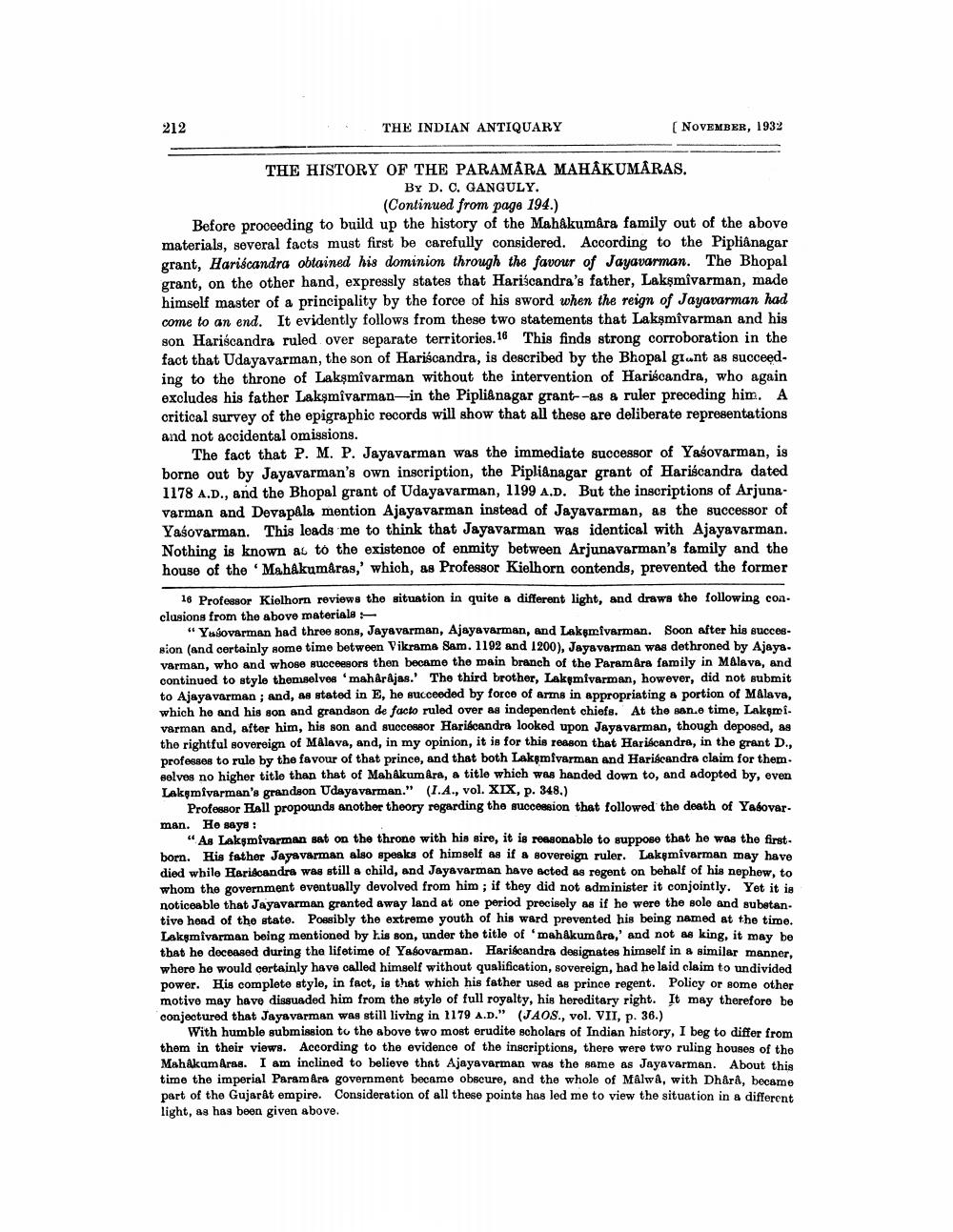________________
212
THE INDIAN ANTIQUARY
(NOVEMBER, 1932
THE HISTORY OF THE PARAMÁRA MAHAKUMARAS.
BY D. C. GANGULY.
(Continued from page 194.) Before proceeding to build up the history of the Mahakumara family out of the above materials, several facts must first be carefully considered. According to the Pipliânagar grant. Hariscandra obtained his dominion through the favour of Jayavarman. The Bhopal grant, on the other hand, expressly states that Hariscandra's father, Laksmivarman, made himself master of a principality by the force of his sword when the reign of Jayavarman had come to an end. It evidently follows from these two statements that Lakşmivarman and his son Hariscandra ruled over separate territories.16 This finds strong corroboration in the fact that Udayavarman, the son of Hariscandra, is described by the Bhopal giunt as succeeding to the throne of Lakşmivarman without the intervention of Hariscandra, who again excludes his father Lakşmivarman-in the Pipliânagar grant--as & ruler preceding him. A critical survey of the epigraphic records will show that all these are deliberate representations and not accidental omissions.
The fact that P. M. P. Jayavarman was the immediate successor of Yasovarman, is borne out by Jayavarman's own inscription, the Piplianagar grant of Hariscandra dated 1178 A.D., and the Bhopal grant of Udayavarman, 1199 A.D. But the inscriptions of Arjunavarman and Devapala mention Ajayavarman instead of Jayavarman, as the successor of Yasovarman. This leads me to think that Jayavarman was identical with Ajayavarman. Nothing is known as to the existence of enmity between Arjunavarman's family and the house of the MahAkumaras,' which, as Professor Kielhorn contends, prevented the former
16 Professor Kielhorn reviews the situation in quite a different light, and draws the following coa. clusions from the above materials
"Yugovarman had three sons, Jayavarman, Ajayavarman, and Lakemivarman. Soon after his succesBion (and certainly some time between Vikrama Sam. 1192 and 1200), Jayavarman was dethroned by Ajays. varman, who and whose guccesors then became the main branch of the Paramára family in Malaya, and continued to style themselves 'maharajas.' The third brother, Lakomivarman, however, did not submit to Ajayavarman ; and, as stated in E, he succeeded by force of arms in appropriating a portion of Malava, which he and his son and grandson de facto ruled over as independent chiefs. At the san.e time, Lakşmi. varman and, after him, his son and successor Hariscandra looked upon Jayavarman, though deposed, as the rightful sovereign of Malaya, and, in my opinion, it is for this reason that Haricandra, in the grant D., professes to rule by the favour of that prince, and that both Lakşmivarman and Hariscandra claim for them. selves no higher title than that of Mahakumara, a title which was handed down to, and adopted by, even Lakşmivarman's grandson Udayavarman." (1.A., vol. XIX, p. 348.)
Professor Hall propounds another theory regarding the succession that followed the death of Yasovarman. He says:
"As Laksmivarman sat on the throne with his sire, it is reasonable to suppose that he was the firstborn. His father Jayavarman also speaks of himself as if a sovereign ruler. Lakşmivarman may have died while Hariscandra was still a child, and Jayavarman have acted as regent on behalf of his nephew, to whom the government eventually devolved from him; if they did not administer it conjointly. Yet it is noticeable that Jayavarman granted away land at one period precisely as if he were the sole and subetan. tive head of the state. Possibly the extreme youth of his ward prevented his being named at the time. Lakşmivarman being mentioned by his son, under the title of 'mahakumara,' and not as king, it may be that he deceased during the lifetime of Yalovarman. Hariscandra designates himself in a similar manner. where he would certainly have called himself without qualification, sovereign, had he laid claim to undivided power. His completo style, in fact, is that which his father used as prince regent. Policy or some other motive may have dissuaded him from the style of full royalty, his hereditary right. It may therefore be conjectured that Jayavarman was still living in 1179 A.D." (JAOS., vol. VII, p. 36.)
With humble submission to the above two most erudite scholars of Indian history, I beg to differ from them in their views. According to the evidence of the inscriptions, there were two ruling houses of the MahAkum Arsa. I am inclined to believe that Ajayavarman was the same as Jayavarman. About this time the imperial Param Ara government became obscure, and the whole of Malwa, with Dhârâ, became part of the Gujarat empire. Consideration of all these pointe has led me to view the situation in a different light, as has been given above.




